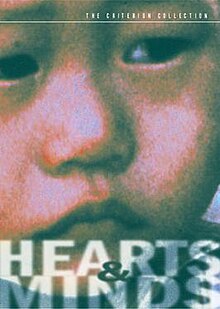| Revision as of 05:20, 27 January 2008 editDreadstar (talk | contribs)53,180 edits Clearly WP:UNDUE, and this needs consensus per Talk:George_Thomas_Coker#Text_to_be_inserted_re_Hearts_and_Minds← Previous edit | Revision as of 05:43, 27 January 2008 edit undoDreadstar (talk | contribs)53,180 edits Self-revert to allow other editors to comment. Seems WP:UNDUE to me.Next edit → | ||
| Line 18: | Line 18: | ||
| During his acceptance of the Oscar award, co-producer Bert Schneider said, "It's ironic that we're here at a time just before Vietnam is about to be liberated" and then read a "Greetings of Friendship to all American People" from the ]ese government. ] retaliated later by reading a letter from ], another presenter on the show, "The academy is saying, 'We are not responsible for any political references made on the program, and we are sorry they had to take place this evening.'" | During his acceptance of the Oscar award, co-producer Bert Schneider said, "It's ironic that we're here at a time just before Vietnam is about to be liberated" and then read a "Greetings of Friendship to all American People" from the ]ese government. ] retaliated later by reading a letter from ], another presenter on the show, "The academy is saying, 'We are not responsible for any political references made on the program, and we are sorry they had to take place this evening.'" | ||
| The film includes extensive clips of ], a ] aviator who had been held by the North Vietnamese as a ] for 6½ years.<ref name="washpost">{{Cite web|url=http://www.washingtonpost.com/ac2/wp-dyn/A51347-2004Oct21?language=printer|title='Hearts And Minds' Recaptured |accessdate=2007-12-23|publisher=]|year=2004|author=Desson Thomson}}</ref> One of the film's earliest scenes details a homecoming parade in Coker's honor in his hometown of ], where he tells the assembled crowd on the steps of city hall that if the need arose, that they must be ready to send him back to war.<ref>Anderegg, Michael A. , via ], ]. Accessed ], ].</ref> Answering a student's question about Vietnam at a school assembly, Coker responds that "If it weren't for the people, it would be a beautiful country."<ref>Ng, David. , ''Images: a journal of film and popular culture'', 2002. Accessed ], ]. "When asked by a student what Vietnam was like, he replies in perfect deadpan: 'If it weren't for the people, it would be a beautiful country.'"</ref> | |||
| ==See also== | ==See also== | ||
| *] | *] | ||
| ==References== | |||
| {{Reflist}} | |||
| ==External links== | ==External links== | ||
Revision as of 05:43, 27 January 2008
- This article refers to the 1974 movie; for other uses see Hearts and Minds (disambiguation)
| Hearts and Minds | |
|---|---|
 | |
| Directed by | Peter Davis |
| Produced by | Bert Schneider, Peter Davis |
| Distributed by | Rialto Pictures |
| Release date | 1974 |
| Running time | 112 min. |
| Language | English |
| Budget | $1,000,000 |
Hearts and Minds is an Academy Award winning documentary about the Vietnam War directed by Peter Davis.
The film premiered at the 1974 Cannes Film Festival and won the 1974 Academy Award for Best Feature Documentary. Commercial distribution was delayed in the United States due to threats and lawsuits, including a restraining order obtained by one of the interviewees, former National Security Advisor Walt Rostow. After Columbia Pictures refused to distribute the picture, Bert Schneider and Henry Jaglom purchased back the rights and released the film in March 1975 through Warner Bros. Pictures.
During his acceptance of the Oscar award, co-producer Bert Schneider said, "It's ironic that we're here at a time just before Vietnam is about to be liberated" and then read a "Greetings of Friendship to all American People" from the North Vietnamese government. Frank Sinatra retaliated later by reading a letter from Bob Hope, another presenter on the show, "The academy is saying, 'We are not responsible for any political references made on the program, and we are sorry they had to take place this evening.'"
The film includes extensive clips of George Thomas Coker, a United States Navy aviator who had been held by the North Vietnamese as a prisoner of war for 6½ years. One of the film's earliest scenes details a homecoming parade in Coker's honor in his hometown of Linden, New Jersey, where he tells the assembled crowd on the steps of city hall that if the need arose, that they must be ready to send him back to war. Answering a student's question about Vietnam at a school assembly, Coker responds that "If it weren't for the people, it would be a beautiful country."
See also
References
- Desson Thomson (2004). "'Hearts And Minds' Recaptured". The Washington Post. Retrieved 2007-12-23.
- Anderegg, Michael A. "Inventing Vietnam: The War in Film and Television", via Google Books, Temple University Press. Accessed January 10, 2008.
- Ng, David. "Hearts & Minds - DVD Review", Images: a journal of film and popular culture, 2002. Accessed December 22, 2007. "When asked by a student what Vietnam was like, he replies in perfect deadpan: 'If it weren't for the people, it would be a beautiful country.'"
External links
- Hearts and Minds at IMDb
- Criterion Collection essay by Judith Crist
- Criterion Collection essay by George Herring
- Criterion Collection essay by Ngo Vinh Long
- Criterion Collection essay by Robert K. Brigham
- Documentary Viewing Guides - Viewing guides for Hearts and Minds and other documentaries, created by undergraduate students at Trinity University.
This article about a documentary work about war for radio, television, or the internet is a stub. You can help Misplaced Pages by expanding it. |
| Preceded byThe Great American Cowboy | Academy Award for Documentary Feature 1974 |
Succeeded byThe Man Who Skied Down Everest |